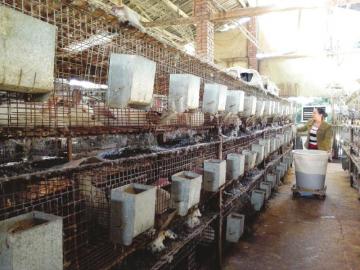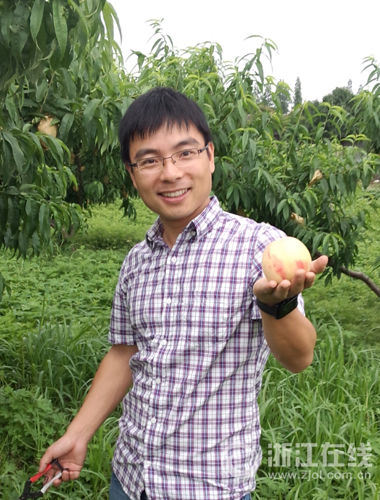The income of migrant workers returning to their hometown to raise chickens increases by 300000 a year.

Zou Xingli feeds the rabbit
Getting up at 6 o'clock every morning, loading more than 10 native chickens and more than 100 chickens into pick-up trucks and taking them to the town for sale has become the daily norm of Wang Jiubo, a villager in Jiazikou, Jiuzhi Town, Hejiang County, Luzhou. It is also his happiest period of "earning money" every day.
For more than three years after returning to his hometown, Wang Jiubo and his wife successively raised rabbits, native chickens, and hatched chicks at home. Compared with the days of working outside for eight years, Wang Jiubo admitted that he was down-to-earth and had a sense of belonging when he returned to his hometown.
A statistical information from the Luzhou Employment Bureau shows that since January 2013, 5194 migrant workers have returned home to start businesses in the city, with a total investment of 3.77 billion yuan, directly driving more than 40, 000 villagers around to work. The local government has also formulated a variety of measures to actively create conditions for returning migrant workers to start their own businesses and open up a "green channel" for migrant workers to start their own businesses.
Home run aquaculture
Wage earners earn 300000 a year
Three years ago, Wang Jiubo and his wife Zou Xingli, who had worked in Zhejiang for eight years, returned to their hometown of Hejiang Jiuzhi.
During their absence, the couple had no special skills and made money by transporting goods. In the second half of 2012, due to poor business, his hometown happened to be developing. Thinking that he could take care of the family, Wang Jiubo discussed with his family and decided to go back to his hometown for development.
Owning his own land in his hometown in the countryside is Wang Jiubo's advantage. Wang Jiubo's land was close to the house, and the couple who returned to their hometown set up a rabbit breeding base of more than 300 square meters on flat land less than 50 meters from home, and began to raise rabbits. Three years have passed, and now, every month, Wang Jiubo's rabbit breeding land can produce more than 1000 caged rabbits, and there is no worry about the market.
Since the beginning of this year, Wang Jiubo and his wife have begun to discuss the development of another aquaculture industry, so there are hordes of native chickens on another hillside near their home every day. Wang Jiubo said that since the beginning of this year, in addition to raising more than 20, 000 native chickens, they are also hatching chicks. At present, there are more than 1000 chickens for sale at home.
Zou Xingli made a small calculation. So far this year, nearly 30, 000 chickens have been sold, and nearly 7000 native chickens have been sold. According to the fact that a chicken can earn 8 yuan and a native chicken can earn 15 yuan, then this year, the income from raising chickens alone is 345000.
Wang Jiubo said that next year, the farm will be further expanded. "near my home, there are still hundreds of mu of mountain forest. I plan to set up a Ningxia farm here to feed native chickens."
What does returning to my hometown bring to me? Wang Jiubo said frankly, "I only know when I work outside. I eat in a hurry every day, and I really can't stop thinking about my baby." Now, every night, the family dines around the round table, which is a pleasure that he could not even think of a few years ago.
Return to hometown to learn techniques
A builder starts his own business and becomes a boss.
Yu Zongqin, the boss, is building a shed for grapes together with other fruit growers in the "Nine colors Tianyuan" orchard in Dadukou Town, Naxi District, Luzhou City on November 20. For Yu Zongqin, it is a happy thing for him to return to his hometown to build an orchard after drifting away for many years.
Yu Zongqin is from Dadukou Town, Naxi District, Luzhou City. In 2004, Yu Zongqin left his hometown to work in other places and began to work in the construction industry, moving around the country. However, after drifting for many years, he is eager to return to his hometown one day and have a career of his own.
After passing the exam in 2010, he returned to Luzhou for three years of full-time training and studied 21 subjects such as agriculture and entrepreneurship. After completing his study, Yu Zongqin no longer went to work in other places, but began to start his own business. After many investigations, Yu Zongqin decided to invest in agriculture and began to set up an orchard in his hometown. "when I first came back, this piece of land in the orchard was still an abandoned factory and wasteland. Thinking that it was a pity that the land was empty, I decided to take it down."
At first, Yu Zongqin did not transfer much land, and he only planned to grow some grapes and do a little business. However, with the later support of the government, there were more and more disposable land, and finally the scale of the land reached 700 mu. So he began to plant more fruit. Today, Yu Zongqin has built the 700 mu of land into an orchard and began to plant all kinds of fruits in the orchard. "what I want is that there can be fruit in the orchard all the year round. Turn it into an experiential picking base, and now it has been planted with oranges, plums, watermelons and peaches. After a little more time, it will all grow up. "
/ cause analysis /
In Jiuzhi town, the number of entrepreneurs of migrant workers returning home like Wang Jiubo is gradually increasing in recent years. Bai Zhengtao, a staff member of the Jiuzhi Town Employment and Labor Security Service Center, said that this year alone, more than 100 farmers have registered with the industrial and commercial institutes to start their own businesses. Another data change that can be seen is that the amount of loans applied for every year is also gradually rising, which is several times higher than in previous years. The local government has noted that the entrepreneurship of migrant workers returning home is mainly based on the development of aquaculture. In order to build a better sales channel for entrepreneurs, the local government is considering setting up a "large wholesale market for agricultural products" in the town next year.
"not only can you take care of your family nearby, but everyone can also make money at home. Why not do it?" Bai Zhengtao said: taking Nine branches as an example, Jiuzhi Town is an important node of two-way docking between Sichuan and Guizhou Province, which is across the river and connected by a bridge with Chishui, Guizhou Province. at the same time, it is also a demonstration pilot town of a state-made town, and is currently focusing on building a major border trade and tourism town. In the process of development, with the continuous construction and improvement of urban traffic roads and infrastructure, the hometown environment is getting better and better, more and more migrant workers choose to return to Nine branches.
Bai Zhengtao said that in recent years, the development of the town has brought him a lot of surprises, but what surprises him most is that the registered population of the town in Jiuzhi Town was less than 7,000, but now there are nearly 30,000 people living in the town for a long time. "when many people go home, they earn money and are willing to come to town to buy houses." Bai Zhengtao said.
/ Policy help /
The general trend is that the government opens a "green channel" for entrepreneurship.
According to the statistical information of Luzhou Employment Bureau, so far, there are more than 1.5 million migrant workers in Luzhou. According to preliminary statistics, since January 2013, 5194 migrant workers and 501 peasant entrepreneurs have returned to their hometown, with a total investment of 3.77 billion yuan, directly leading to the employment of more than 40, 000 villagers around the city.
"when investigating the entrepreneurial situation of migrant workers returning home, we found that there are four main entrepreneurial models." According to the person in charge of the Luzhou Employment Bureau, the first is the basic survival model. This kind of entrepreneurship is mainly manifested in small family workshops, small factories, snack shops, small restaurants and so on, which do not require high capital, technology and management. Second, the policy guides the industry-driven model, making use of the different resources and advantages of different districts and counties to carry out planting, breeding and so on. Third, the entrepreneurial model of part-time transformation, workers bring back technology, management experience, market customers and orders, and some also bring back skilled workers, so the entrepreneurial success rate is higher. Fourth, the mode of "capable person + returning home to start a business and mutual assistance" directly drives more than 100 villagers around to find employment.
In addition, from the perspective of entrepreneurial industries of migrant workers returning to their hometown, entrepreneurs in the primary and tertiary industries account for 86% of entrepreneurs returning home. "therefore, we also carry out entrepreneurial training for returning migrant workers. For example, the training occupied by the primary industry and the tertiary industry will be much more." The person in charge introduced.
- Prev

The young man in Jiaxing adhered to the "six-character mantra" and went back to his hometown to start a business.
The young man in Jiaxing adhered to the "six-character mantra" and went back to his hometown to start a business.
- Next

The Wealth Code behind the Color varieties
The Wealth Code behind the Color varieties
Related
- A course of planting techniques and methods on how to grow carrots
- How to plant the latest tulips?
- Is it better to pick tea in the morning or in the afternoon? When is the best time for tea to be picked? what is the third or fifth tea?
- Launch Yuanxiao Happy combination Haocha + Tea Yuan healthy Taste
- Penghu Tourism "Fireworks 20 Parade with You"
- 2022 West Lake Happiness holds "Digital Revitalization Voucher" and draws iphone13 and laptop.
- Banqiao Fuzhou social houses are designed to change start-up combined with police elimination to create a safe and livable environment
- The convenient measure of "mechanical weeding" in Xinbei has been abused and the Agriculture Bureau has imposed heavy penalties on the illegal land consolidation.
- Changgeng University Joins Hands with Four Memory Factories to Rescue Memory Talent Shortage
- The list of Taiwan's top 100 MVP managers is listed by the Director-General of the Farmers' Association of Sanxia District.

